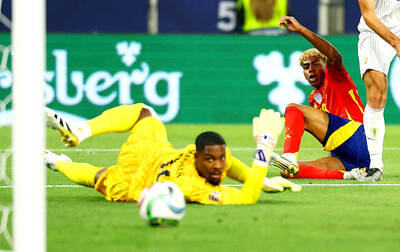Most Brazilian soccer players dream of making it to a top European club. However, these days some of the country’s most promising players are heading to a very different sporting nation.
China is fast becoming the new destination for some of Brazil’s best players, rather than the English Premier League, Spain’s La Liga or the Bundesliga in Germany.
Thanks to hefty investments to boost soccer in the Asian country, Chinese teams have become much more attractive to Brazilian and South American players, making high salary offers that overshadow the players’ desire to move to better clubs in Europe.
China was the country that has spent the most on transfers from Brazilian clubs so far this year, topping nearly US$40 million in the signing of nine South American players, including two from Brazil’s national team.
“China is trying to become a global player in the sport, it wants to become relevant internationally,” said Fernando Ferreira, head of the Brazilian sports consultancy firm Pluri. “And signing some of the best players in Brazil is part of this process, it’s part of the strategy. They are coming to Brazil to gather ‘raw material,’ to find ‘skilled labor.’”
China has been steadily ramping up investments on foreign players and is the third country with the highest spending on international transfers this year, according to numbers released through FIFA’s transfer matching system, behind Germany (US$118 million) and England (US$174 million).
Chinese clubs have spent more than US$85 million on the international market through March 17, FIFA said, more than five times what it spent in 2013. They have already spent nearly US$7 million more this year than in all last year.
Ukraine, Italy and Spain were the countries that spent the most to recruit players from Brazilian clubs between 2011 and last year, but now they are all about to be surpassed by China. It has become harder for other markets to compete with the Chinese, especially for second-tier players not usually targeted by big-spending teams such as Barcelona, Real Madrid or Chelsea. These players are now getting better offers from China than from the smaller European clubs that had been signing them.
“Players worth 3 or 4 million euros [US$3.18 million or US$4.23 million] to teams in Europe now are being signed for about 10 million [euros] in China,” Ferreira said.
“Some European countries are not being able to sign as many players as before, and China has emerged as a new market, investing in football and taking away the best players and coaches to try to improve their game,” Brazil coach Dunga said. “We have to adapt to this the best way we can.”
Striker Diego Tardelli this year became the first player from a Chinese club to be picked for Brazil’s national team. He was considered one of the top prospects in the country when he made the move to Shandong Luneng instead of taking up other deals that could have increased his profile.
Before accepting the transfer, Tardelli said he called Dunga to ask if he would risk losing his place in the national team by going to a country that lacks a soccer tradition.
“I told him that I won’t analyze a player just by taking into consideration where he is playing, I’ll analyze him based on his performance,” Dunga said. “But we have to understand that there will be more pressure on these players. If they don’t play well, people will quickly say that it’s because they went to a country where football is not as competitive.”
Tardelli said he will still be able to play at a top level in China.
“I’m not too worried, we play in some high-level competitions here,” he told Brazil’s SporTV. “Maybe the technical quality is not the same as in Brazil and Europe, but it’s not going to be a problem.”
Another high-profile Brazilian to move to Chinese soccer was 23-year-old playmaker Ricardo Goulart, who helped Cruzeiro win two-straight Brazilian league titles and was being looked at closely by some top European clubs after making his debut with Brazil last year.
Goulart’s reported US$16.2 million move to Guangzhou Evergrande was the biggest transaction involving a Brazilian club in the latest transfer window, and the highest ever for a Brazilian player going to China.
With Brazilian clubs contend with financial problems, it is difficult for players to reject big transfer fees and monthly salaries of about US$350,000, nearly three times more than local clubs can afford to pay their top players. Established stars such as Neymar still make a lot more in the top European clubs, especially including earnings with sponsors and other endorsements.
Other players who left Brazilian clubs this year for the high salaries in China include Argentines Hernan Barcos and Dario Conca, as well as Bolivia’s Marcelo Moreno.
About 30 percent of the foreign players in China’s Super League are Brazilians or came from Brazilian clubs.
“This is going to continue for some time,” Ferreira said. “China will continue to be an attractive market to football players and we can only assume that the country will eventually succeed in its quest to become a world power in football.”

Badminton world No. 3 Anders Antonsen clinched his first Indonesia Open title yesterday after beating Taiwan’s Chou Tien-chen, while South Korea’s An Se-young won her second championship in Jakarta. The 28-year-old Dane sank world No. 7 Chou at the Indonesian capital’s Istora Senayan arena, winning 22-20, 21-14 in a 60-minute match to secure the prestigious Super 1000 event. Antonsen came out on top in a tightly contested first game before cruising to victory in the second. In a more closely fought women’s singles final, South Korean ace and world No. 1 An fought back from one game down to beat China’s

Spain starlets Lamine Yamal and Nico Williams dazzled on Thursday as La Roja beat France 5-4 in a thriller in Stuttgart, Germany, to set up a UEFA Nations League final with Portugal. Yamal bagged a brace, while Williams scored and provided an assist as the two wingers cut France’s makeshift defense to ribbons. Mikel Merino and Pedri were also on the score sheet for the UEFA Euro 2024 champions. Kylian Mbappe netted a second-half penalty, but Spain were 5-1 up and cruising, before Les Bleus suddenly woke up as their opponents took their foot off the pedal. France’s three late goals — a

Italy crashed to a 3-0 loss away to Norway, as the four-time FIFA World Cup champions made a disastrous start to their 2026 World Cup qualifying campaign on Friday, while Belgium had to settle for a draw in North Macedonia. Alexander Sorloth, Antonio Nusa and Erling Haaland all scored in the first half in pouring rain in Oslo as Norway made it a night to forget for Italy, who missed out on the past two World Cups. “I have no explanation. Our supporters don’t deserve this kind of match. We need to do some soul-searching. It’s unacceptable,” Italy captain and goalkeeper Gianluigi

The Crusaders yesterday produced a clinical performance in difficult conditions to beat the Queensland Reds 32-12 and claim home advantage in next week’s Super Rugby semi-finals. Lock Scott Barrett and prop Tamaiti Williams scored first-half tries to reward an outstanding performance from the Crusaders’ forwards in wet, slippery conditions and bitterly cold temperatures. Scrumhalf Noah Hotham defied the conditions in the second half to score a superb solo try and, after kicking a conversion and penalty to make the score 22-0 at the hour mark, flyhalf Rivez Reihana scored a try which took the game beyond the Reds. “Typical Christchurch weather, cold, wet